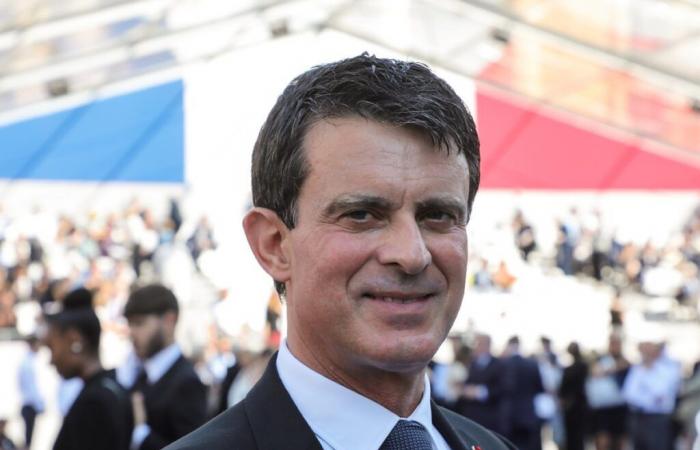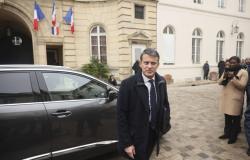Keystone-SDA
France finally has a new government. This one gives pride of place to old names, with many past heavyweights of French politics, including two former prime ministers.
This content was published on
December 23, 2024 – 10:34 p.m.
(Keystone-ATS) The Ministers of Foreign Affairs Jean-Noël Barrot and the Armed Forces Sébastien Lecornu have been reappointed to their respective positions in the new executive of centrist Prime Minister François Bayrou, announced Monday evening by the French presidency.
The government is also marked by the return of former prime ministers Elisabeth Borne and Manuel Valls, respectively to Education and Overseas Territories, as well as former Minister of the Interior Gérald Darmanin appointed to Justice.
Despite his divisive profile, Bruno Retailleau was reappointed Minister of the Interior, reaping the fruits of his announced measures to fight delinquency, drug trafficking and immigration, particularly in the French archipelago of Mayotte.
The director of the public financial institution Caisse des Dépôts et Consignations, Eric Lombard, becomes Minister of Economy and Finance, a crucial position as France faces one of the worst budgetary crises in its recent history.
Among the other names: Catherine Vautrin, a close friend of former right-wing president Nicolas Sarkozy, appointed to head a major Ministry of Health and Labor.
Cold reception on the left
Mr. Bayrou, appointed on December 13, said he wanted to make appointments before Christmas. Monday evening on BFMTV, the new 73-year-old Prime Minister said he was “proud” of a “collective of experience to reconcile and renew trust with all French people”, ten days after his arrival in Matignon.
He said he was “convinced” that this government and the “action” it intends to take “will ensure that we will not be censored”. And to add that he would not seek confidence in the Assembly on his general policy declaration.
On the thorny subject of the Budget, he said he wanted to achieve a “balance” around 5% or “a little more than 5%” of public deficit in 2025. The first council of ministers will be held on January 3, said the Elysée.
Mr. Bayrou refuted any “influence” of the RN on the composition of his government, and explained that Xavier Bertrand had an “approach” considered “violent” which was not his for this position.
But the composition of this team was very warmly welcomed by the left, which came first in the June legislative elections. “An extreme right in power, under the surveillance of the extreme right,” judged the boss of the socialist party, Olivier Faure.
The head of the Ecologists, Marine Tondelier, denounced the “indignity” of Mr. Bayrou, who “puts himself back in the hands of the extreme right”
“Coalition of Failure”
Mr. Bayrou was appointed by Emmanuel Macron after lengthy consultations to find a successor to the conservative Michel Barnier, whose minority government was overthrown on December 4 by left and far-right deputies after only three months in office.
Monday evening's announcement puts an end to ten days of negotiations between MM. Bayrou and Macron.
The government team has 35 members, fewer than the Barnier government (42) but less tight than envisaged, and almost equal with 18 women and 17 men. And marked by a certain continuity with 19 ministers retained in the new team. Which is already sparking an avalanche of criticism from the oppositions.
The president of the RN Jordan Bardella accused Mr. Bayrou of having “brought together the coalition of failure”.
Mr. Bayrou is the sixth head of government since Mr. Macron's first election in 2017 and the fourth since the start of the year, an instability that France has not experienced for decades.
The new prime minister must navigate the fragmented political scene resulting from the early legislative elections organized after the surprise dissolution of the National Assembly by Mr. Macron in June. The hemicycle is fractured into three blocks (left alliance / Macronists and centrists / extreme right); none has an absolute majority.
Urgency: budget
Mr. Bayrou wanted to form a tight team that was as open as possible. He wanted it to include significant figures, from the left as well as the right and center, in order to respond to the emergencies facing the country and avoid further censorship. But this opening objective is far from being achieved.
Above all, ministers will have to urgently prepare a budget for 2025, under pressure from oppositions and the financial markets.
Expected at 6.1% of GDP in 2024, much higher than the 4.4% forecast for fall 2023, the public deficit would miss its target of 5% in the absence of a budget.
Mr. Bayrou's first week in Matignon was especially marked by the barrage of criticism over his presence on the municipal council of Pau, a town in the southwest of which he intends to remain mayor, in the midst of a crisis in Mayotte, hit by a devastating cyclone.
He has a historically low popularity rating for taking office, with 66% of French people saying they are dissatisfied, according to a barometer published on Sunday.






